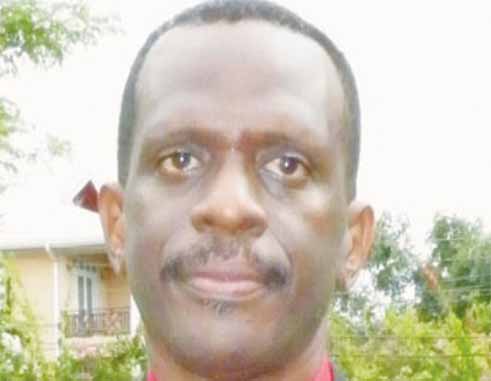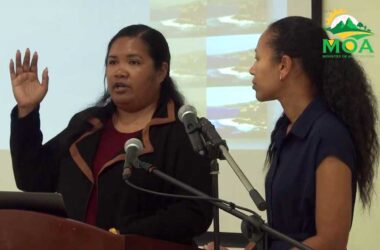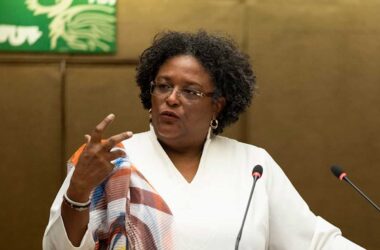Criticizes The Commission Members As Well.

ELECTED parliamentarians are speaking out against several of the recommendations contained in the report of the Constitutional Commission which was debated in the House of Assembly Tuesday. The debate will continue next Tuesday.
And while many MPs are of the view that the island’s Constitution is in need of reform they found issue with several of the 190 recommendations outlined in the report. One of the main objections is with the recommendation that an elected member of parliament must resign from that chamber should he/she decide to take up a Ministerial position.
Richard Frederick, Castries Central Parliamentary Representative, described this recommendation as “ludicrous and preposterous” foretelling the return of ‘massa’ days should that recommendation see the light of day.
Alvina Reynolds, the current Health Minister and Babonneau representative noted that such a recommendation can cause conflict in the constituencies.
But it was Phillip J. Pierre, Castries East representative who really took that particular recommendation to task during the first half of the debate.
First he questioned the revision exercise of the existing Constitution although admitting that as a document of 1979 it needed to be reviewed and changed.
“But the question is: has the Constitution served us well? Has it done what it was supposed to do? Has it created any crisis and has it created any disruption in the country?” Pierre asked.
Using 1979 as a measuring point, he said that the country, from that year onwards, had not gone through a constitutional crisis that had caused total disruption in the country. He credited the Constitution, in its present form, as the entity that handled the 1979 -1982 political upheaval which saw the implosion of the Labour Party led government and the country’s quick return to normalcy.
“The people are the ones who must tell us how to run the country and not any group of men or women who believe that they have the better brain, or do not want to take the heartache and the pressure of running political office but want to constitutionalize their position to be able to tell people what to do, because they believe probably because of their education, their background or their class or financial position that they have the right to dictate what is happening in the country”, Pierre said saying that he saw this clearly in some of the recommendations contained in the report.
Regarding the recommendation that elected parliamentarians must resign their post if appointed a Minister, Pierre argued that average Saint Lucians know what they want for themselves, their children and their constituencies. Therefore when they exercise their right to vote they are voting for someone who meets their aspirations and who could improve the quality of life for themselves and their children.
“Even though you may not agree with that choice, the person who is elected is the person the majority of persons believe can help them to improve their quality of life,” Pierre said.
Pierre came close to labelling the recommendation as ludicrous since it entails aborting the present system and putting in place what he called people who have absolutely no link with the masses in the constituencies and who have never understood what it meant to be rebuffed as a politician, who do not understand the needs of constituents and who do not understand mothers who do not have money to send their children to school.
The recommendation states that there should be the creation of a mixed model of government with a different kind of Executive branch, to that which currently prevails.
Under that new system the only member of the Executive branch who will belong to both the Legislature and the Executive will be the Prime Minister. However, the Deputy Prime Minister will serve as a member of Cabinet without ministerial authority except when deputizing for the Prime Minister.
To this end, he/she will be appointed on the basis of ability to command the support of a majority of elected Members of Parliament and he/she will appoint Ministers. If a minister is selected from Parliament, he/she must subsequently resign as a Member of Parliament, to take up the post of Minister. The appointment of any Minister from the House of Assembly will require a substitute Member of Parliament to replace the Member of Parliament for the constituency that the Minister previously represented. And that in order to effect this, one option is that political parties can be required under the new constitutional arrangement to name running mates for all constituencies that are being contested in general elections or by-elections and independent candidates will be required to name a substitute if they contest an election.
But are the politicians missing the point made by the Commission in putting forth that recommendation?
According to the report the Commission advocated the creation of a hybrid parliamentary – presidential constitution with parliamentarism being the dominant force, a somewhat unique system in the Caribbean.
Under this system, the Prime Minister would select Ministers who may emerge from Parliament but who must subsequently resign their position in the Parliament.
In doing so, the elected Members of Parliament would only hold their positions as constituency representatives and as legislators. The hope is that this would lead to the development of professional legislators who could devote time to the scrutiny of legislation and provide oversight of the Executive through committees, while at the same time devoting themselves to the demands of their constituencies.
According to the report the objective was to create a greater check and balance against the exercise of excessive power, meaning that there will no longer be a parliament dominated by the executive since members of the executive branch will now be prevented from being members of the legislative branch with the exception of the Prime Minister and the Deputy Prime Minister.
According to Commissioners this reform of the political system in Saint Lucia was as a result of the strong concerns expressed by Saint Lucians during consultation with the Commission.
Commissioners claimed that the nature of the political system in the region was one of the most consistent themes to emerge in the consultations they had with Saint Lucians and that Saint Lucians expressed strong concerns about the seeming lack of a system of checks and balances, the nature and composition of the parliament, the overwhelming power of the Prime Minister, and the minimum time that parliamentary representatives devote to constituency matters.
The Commission considered all of those issues in arriving at its recommendations on reforming the parliament in Saint Lucia.
















The volcanoes are bubbling and will erupt, activated by the piecemeal nature of the political system in the region.
As St Lucians celebrate the anniversary of independence we must also reflect on the events which too place in Grenada in 1979. But in general I firmly believe there are several other solutions to introduce a system that could address “the strong concerns about the seemingly lack of a system of checks and balances, the nature and composition of the Parliament, the overwhelming power of the Prime Minister, and the minimum time that parliamentary representatives devote to constituency matters”. I firmly believe judging from what I have read to-date a comprehensive consultation process needs to evolve from the bottom up not top to bottom.
There is little that is wrong with the constitution, it is the morons occupying the hot seat who are the main culprits.
The constitution is an adequate framework, but you can never legislate for idiots and malevolents who have nefarious motives. Most people’s complaints with politicians can be summised as follows:
1 – them enriching themselves and supporters at the expense of the nation. This is down to poor procurement policies and lack of oversight and accountability. No constitutional tinkering is necessary, just better quality people watching how the money is spent.
2 Lucians getting confused as to the role of an mp. You don’t want MPs never being in the constituency, but at the same time many feel like they should be some sort of social worker who is there 24/7. Local issues should be devolved back to the council where possible to fix things like drains, paths. It’s the lack of subsidiarity which has concentrated power at national level.
3 there are too many people who want to be the head chef but don’t really understand what good governance is or have an ability to think long term. Because they are reliant on government to make themselves rich, they can’t remove themselves from the daily ro ro.
Most of government work is essentially process management, but the average Lucian politician doesn’t have the eye for detail; instead they want to say they have signed this, or have their picture taken opening a bridge. This is why things are falling into disrepair. Look at that Dr who wants to become an MP – he opens his mouth on subjects he has little understanding of and then looks like a fool.
None of these things require constitutional change, so people need to stop manufacturing false solutions – the constitution is clear on how the grynberg situation was to be managed and it wasn’t followed. Case closed.
true democracy is when people have direct vote. (sample= Swizzerland)
Unfortunately most governments are run by lawyers, more concerned with reelections rather then financial experts.